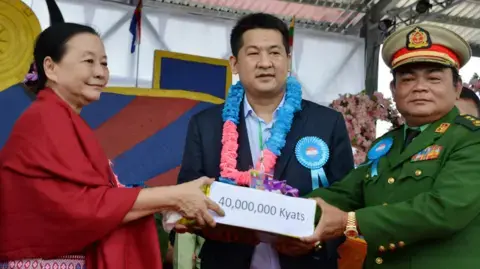Koh Ewe and
Jonathan Head,South East Asia correspondent
She Zhijiang, a Chinese national accused of building an illicit gambling empire in South East Asia, is being extradited to China – ending his years-long battle against the order.
He has been detained in Thailand since 2022, after the Thai police arrested him acting on a Chinese request to Interpol.
China accuses She Zhijiang of running illegal online gambling rings, and this week a Thai court upheld the decision to extradite him. He arrived at a Bangkok airport on Wednesday, flanked by two security officials.
His extradition comes ahead of a landmark visit by Thailand’s king to Beijing – the first state visit to China by a reigning Thai monarch and a sign of deepening ties.
 Central Investigative Bureau, Royal Thai Police
Central Investigative Bureau, Royal Thai PoliceShe Zhijiang is one of the biggest names linked to the vast cyberscam hubs in South East Asia, which have trapped thousands of Chinese nationals and sparked a crackdown from Beijing.
One of his most notorious projects is Myanmar’s Shwe Kokko city, near the Thai border.
It’s portrayed in promotional videos as a resort city for Chinese tourists, but its glitzy buildings are allegedly home to fraud, money laundering and human trafficking.
During a visit to the city earlier this year, the BBC saw very few overseas visitors. Local people there said that scam businesses were still operating.
She Zhijiang and his company Yatai is sanctioned by the UK and the US for his links to rights abuses in the scam farms in their development.
Speaking to the BBC from prison earlier this year, She Zhijiang maintained that his company would “never accept telecom fraud and scams” – though he also noted admitted that scammers were likely to enter Shwe Kokko since the city was “completely open to anyone”.
 Courtesy Yatai
Courtesy YataiWho is She Zhijiang?
Born in a poor village in Hunan province in China in 1982, She Zhijiang left school at 14 and learned computer coding.
He appears to have moved to the Philippines in his early 20s and into online gambling, which is illegal in China. In 2014 a Chinese court convicted him of running an illegal lottery.
But over the years he expanded his gambling business to Cambodia and other countries in the region.
He also holds Cambodian and Myanmar citizenship, according to the US Treasury.
The UN estimates that hundreds of thousands of people are trapped in scam centres concentrated in South East Asia. They are often lured there by fake job offers and held against their will, forced to defraud others online or face brutal punishment.
Many of them are Chinese nationals – a source of concern for Beijing. China has been ramping up crackdowns on such scam operations. In recent months it has sentenced multiple members of Chinese “mafia” families to death.



